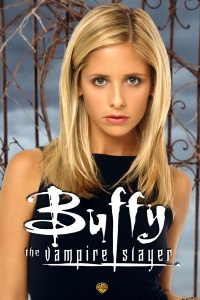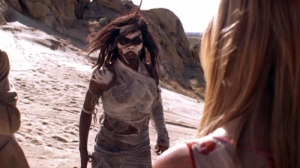I finally got around to watching every single episode of Buffy the Vampire Slayer and these are my feelz.
1) Why did I ever think this show was going to be scary? Except for Hush. Hush was terrifying.
2) SMG is a goddess.
3) Spike me!
4) Idk that Joss Whedon deserves any feminist/progressive merit badges for this one…
I decided to watch Buffy the Vampire Slayer because I liked Firefly (yes I’m one of THOSE people) and because the blogosphere can’t seem to shut up about Joss Whedon and whether or not he’s a feminist and because it’s consistently referred to as one of the most influential sci-fi/fantasy shows of recent times. Watching it made me feel simultaneously excited and disappointed. I LOVED how much ass Buffy was kicking, and SUPER LOVED Willow in all her ways and shapes and forms, but there were also moments where I felt like annoying sitcom gender tropes were being trotted out for an easy laugh, not to mention several not-so-insignificant race fails that made me want to bang my head against the wall (head banging was in in the 90s, right?). Even harder for me to watch, even as I was shipping, was the Buffy-Spike relationship- it sort of felt like “but he had no soul” was the new “but he wasn’t himself bc drugs/alcohol/rage” re: rape attempts. This plus the enormous rape fail that was Dollhouse (look, I enjoyed it but we all have to admit that it was total shit on rape) does not make me feel like throwing Joss Whedon a big ol’ feminist parade.
Does Buffy deserve the hype? I think so- although as the boyf pointed out to me it has definitely profited from the Netflix-fueled nostalgia bump. It’s campy and it knows it (much like Sleepy Hollow these days), but also manages to grapple with issues like grief, death, immortality, and loneliness, and to do it over time. I appreciated that the problems that the characters were facing didn’t magically resolve themselves in each episode and that there were actually long-term consequences for their actions. I think the concept of Buffy as an uber-progressive show doesn’t weather well, especially given its conspicuous lack of diversity and tendency to make people of color into mystical tribal beings.
Exhibit A: The First Slayer
Not pictured: Mystical Inca Mummy Princess, Mystical Warrior Companion, and Mystical Angry Native American.
That being said, Buffy showcased a diverse (but not racially) range of female characters who had their own lives and livelihoods, who loved or didn’t love, who were strong, who were insecure, who were snarky, who were naive, who wore high heels, who wore ratty jeans, and sometimes all of those things at once. It’s kind of sad that this is a huge achievement, but it is still hard to find TV shows or movies or even books where there are a lot of women characters who are distinguishable from one another. And really, those shows didn’t exist until fairly recently (ALL HAIL QUEEN SHONDA). If you poke around in the 90s and early 2000s you can find some really well-developed teen female characters on TV- Freaks and Geeks and My So-Called Life come to mind, but those girls still sort of orbit around the men in their lives. Buffy pulled men into her orbit. She filled her inner circle with men AND women, and those men and women had relationships with her and with each other that weren’t all about sex. And in a society that still doubts that men and women can be friends, that’s pretty radical.
Grade: B+ for Buffy + Spike, no matter what SMG says.




